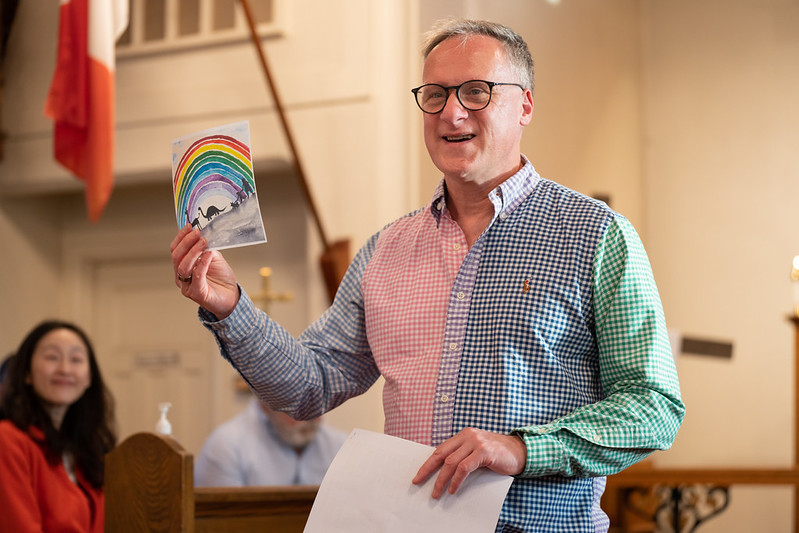We are in the midst of launching a new season of activity in our communities of faith and yet, at the time of writing, there is still uncertainty. Resuming in-person events is calling us, but once again the spectre of a COVID variant places a question mark over our plans. But throughout this whole experience, what has encouraged me the most is the sheer resilience of all of us – Anglicans gathered in different places, determined to continue.
Congratulations to everyone who held on through Zoom worship and Facebook Live services. Yes, the pictures ended up sideways sometimes and the wifi cut out in the middle of the sermon, but we persevered. We are a resilient people with much to hope for and I know that your communities are up to the next challenge.
As the old certainties about how we operated have been largely swept away, the world in which we find ourselves now offers opportunities for the local church; we just need to make some shifts in our thinking. A key shift we need to make has to do with the people who live near our churches and the way we interact with them.
Spiritual – just not Anglican
I was very encouraged by Judy Paulsen’s presentations to our Synod this year. One of the most important things she taught us had to do with the spiritual lives of Quebecers. You may recall the distinctions made in the Angus Reid study between people who are religiously committed, privately faithful, spiritually uncertain and unbelievers. This is not only in relation to Christianity but to religion and belief in God across the board.
What the research shows us is that even if participation in institutional forms of religion is declining, spirituality and faith remain an evolving part of people’s lives. Though not measured in participation in corporate worship or church membership, the fact remains that for about 8 in 10 Canadians, spirituality is an important part of their lives.
This is a huge opportunity for the local church because spirituality is an important part of our lives too. This can be a point of connection between your church and people who live in your community. Your parish is as close to the “ground” as possible and has the most access to the communities in which you are placed. The shift we need to make is in recognizing that many of the people who live all around our Churches are spiritual but they are not Anglican.
We cannot assume that there are enough people moving into our neighbourhoods who identify as Anglican to share among our parishes. Nor can we assume any longer that putting the word “Anglican” (or United Church or Presbyterian or anything else) means anything to most people passing by. That does not mean that we should cease to be who we are or not cherish the traditions that define us. We have gifts to share and we should share them. It simply means that we have to be open to new conversations that start in a different place. Many people want to explore faith and spirit, and so do we. But that faith is often not narrowly defined and we need to be able to hear that.
Faith around the table
One of the growing ministries in our Diocese is Supper Club which meets on Monday evenings. We used to meet in person around dinner. When COVID struck we transitioned to meeting on Zoom and watched each other eating dinner! The real heart of this community is in the conversation, and in the safe space created for people to share their lives and stories. Our conversations range from faith, doubt and God to prayer, Jesus and life. We are able to doubt and disagree, yet also to figure out what faith means to me right now. We’ve shared together, prayed together and grown together. I treasure the new friends I have made at Supper Club and have gained much from knowing them.
Those kind of conversations do not happen during times of public worship, nor are they meant to. But they are the first step in engaging with others about that which is most essential to us as human beings. A great place to start might be amongst yourselves as a community. Think about creating a space in your schedule to get together over dinner and just talk. Have a conversation about something that really matters: faith and doubts, questions.
I grew up going to parish potluck dinners and cannot count how many times I found myself sitting at a table in a Church basement eating, talking and laughing. Along with this obvious community-building, many in the Church have recognized that table fellowship is an opportunity to grow together spiritually. A dinner or coffee house gathering based around a question or conversation can deepen fellowship and create space for true sharing. Think about how much time Jesus spent eating with people. The very first Christians would get together for table fellowship as well as for worship. But the growth point for many of us is in learning to share spiritually in a way that is meaningful to us. Table fellowship can be a great way to foster that. If we can create that safe space amongst ourselves, we will then be able to extend that invitation to others.
A Key Question
A first step in exploring new opportunities for your church is to ask this question of yourselves as a community.
Is there a place in your Church people can share their spiritual journeys? Sometimes the hardest step we have to take is to be able to share faith and doubt, God, Jesus and life amongst ourselves first. This does not happen at coffee hour or in casual conversation. We need to set aside time and space for this important work. See if you can carve out some time in the month to eat and share together in a focused way. If nothing else happens, you will grow together as people of faith, and that is the most important growth there is. And then bring a friend or open up that space to the community.
There is so much hope for the local church as we chart our course through this next season. Because you, the People of God, have shown yourselves to be resilient and dedicated. You have gifts to share. So share them and see what God will do.


